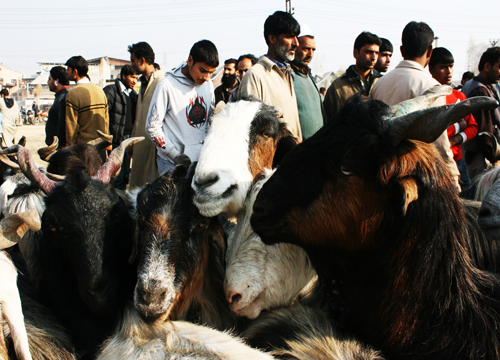As the faithful Muslims throng markets in Srinagar to purchase sacrificial animals on the eve of Eid-ul-Azha, it is the beauty and elegance of the animal that matters more than the cost. More than two lakh sacrificial animals will be slaughtered in Srinagar city alone, SAIMA BHAT reports.

As Eid-ul-Azha, a Muslim holy day marked by sacrificing animals sets in, all play grounds, public parks, parking places and even roadsides have become market places for sacrificial animals. Besides the usual phenomenon of shopping, people are found bargaining at these places usually a week ahead of Eid with the dealers of different varieties of sacrificial animals (goats and sheep).
To serve the purpose of Eid-ul-Azha, people always prefer to buy most beautiful and healthy animals. Jumma, a 110-kg, pure white colour sheep attracted the crowd at Eidgah Park in Srinagar on Wednesday where he was put up for sale by its owner. People who had come to buy sacrificial animals were so fascinated that they started the bid for the white sheep from Rs 55, 000. Due to continuous bidding, Jumma was not sold till this report was filed.
Animals with beauty and elegance are always eye-catchers on such festivities as people prefer to buy special ones. “Muslims all over the world don’t sell or buy sacrificial animals according to weight. It is the looks and the strength that matter while buying an animal. It involves religious sentiments”, says Khazir Muhammad Rigoo, president, All Kashmir Wholesale Mutton Dealers Union.
Few years back, the introduction of camel in the sacrificial animal market took everyone in Kashmir by surprise. The desert animal gave people one more option since the meat of camel is not available in Kashmir. The arrival of camel was well taken and last year few local dealers imported around 100 camels for sacrificial purposes in J&K. This year, due to high rates, only two camels were seen in Kashmir.
“If one camel cost us Rs 45,000 last year, the same camel cost Rs 70,000 this year in Jammu mandi, which means a camel would cost around 1 lakh rupees in Kashmir. So we thought that chances are people may not buy a camel at such a rate” said a dealer who used to bring camels to Kashmir over last two years. But another dealer who bought two this year sold them at Rs 90,000.
As per sheep husbandry department, more than two lakh sacrificial animals will be consumed by Srinagar city only. Saleem Ahmad, an excise official at Lower Munda Post says that till Wednesday afternoon, a total number of 85 trucks carrying sheep have crossed the post.
The major chunk of sacrificial animals is native. On Eid, Gujjar and Bakerwal community come to Srinagar with rare, special varieties of goats and sheep to sell them. Producing around 70 per cent of the total stock, the variety they rear and feed at home is locally known as Garol.
Other varieties sold in markets are Chamba, Himachal, Kandi, Basoli which are specifically meant for sacrificial purposes. As the time of sacrificing is two-and-a-half day-long, the availability of supply is not an issue. As per the study of department of sheep husbandry, ‘the supply of sacrificial animals is more than the demand’.
From the last two years, the J&K government’s Consumer and Public Distribution department has been generous with animal sellers by letting them fix the rates of animals themselves. The department focuses on proper weighing procedures only. “Last year, we had a meeting of divisional commissioner, civil society and mutton dealers association, where we decided the owners of the animals will fix rates themselves. This experiment was successful and we continued with it this year too” says Mushtaq Ahmad Mir, director, CAPD.
President of mutton dealers, Khazir Muhammad, has a different take on the issue. He says the weight was not the deciding factor, “It actually depends on the buyer which animal he chooses and then there is bargaining. We buy animals by bargaining. How can the government fix our rates? If they do, it becomes a crisis for us. Since last year’s meeting, we sell as per our own wish,” he says.
As per Khazir, this Eid, about three lakh animals will be sold in markets since people who move to Jammu with Darbar are still in the valley and the stock of animals is ready. He says the supply exceeds the demand which may result in low rates. “This is the season when Gujjar and Bakerwals are in city with their stock so we have plenty of animals in —















